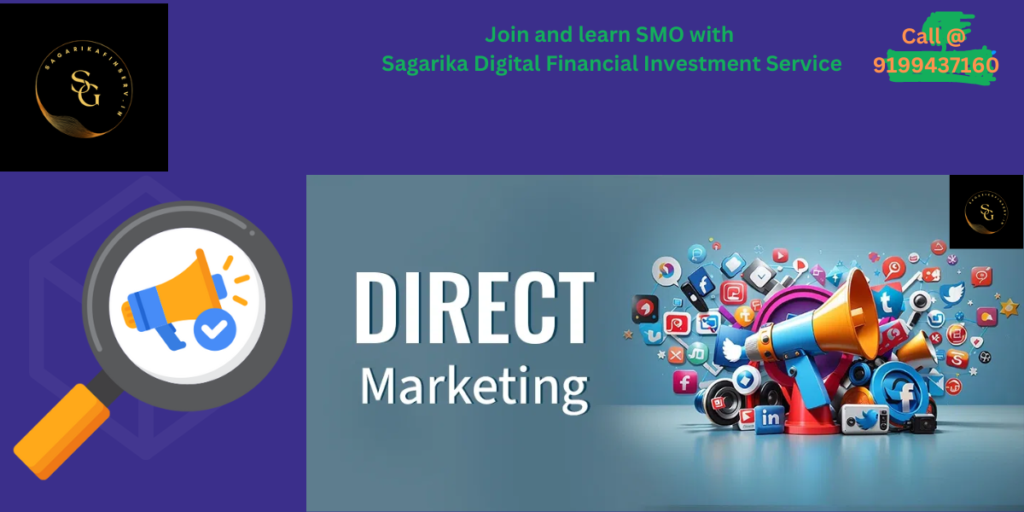Direct Marketing Services

Direct Marketing
Direct marketing is a tactic that includes connecting with prospective clients directly via email, telemarketing, direct mail, and social media message, among other methods. Direct marketing is an alternative to traditional techniques of advertising, which aim to reach a wider audience through individualized one-to-one interactions with targeted client segments. The objective is to elicit prompt responses and establish enduring connections. This approach’s capacity to deliver quantifiable, economical, and focused outcomes has kept it a mainstay of marketing. We’ll examine the many benefits of direct marketing in this post.
Being able to target a very particular demographic is one of direct marketing’s biggest benefits. Businesses can divide their audience into several categories according to factors like age, region, past purchases, or interests by gathering and analyzing data. By using precision targeting, marketing initiatives can be directed towards the people who are most likely to be interested in a given good or service.
Personalized campaigns that cater to the specific wants and tastes of a focused group can be created by firms through direct marketing, as opposed to mass marketing, which spreads the message to a vast but frequently irrelevant audience. Because the message is extremely relevant to the receiver, there is a higher chance of engagement, response, and conversion.
Businesses can customize and personalize their messaging for each customer through direct marketing. A crucial element in enhancing client engagement and loyalty is personalization. Customers are more likely to react favorably when they perceive a message as being tailored just for them. A more personal connection with clients can be established by, for instance, using the recipient’s first name, delivering product recommendations based on previous purchases, or providing special discounts.
Since it is challenging to accomplish this degree of customisation with more general advertising techniques, direct marketing is a useful strategy for strengthening bonds with clients and raising customer satisfaction. Additionally, it cultivates loyalty and trust, both of which are necessary for sustained economic success.
The fact that direct marketing yields incredibly quantifiable outcomes is one of its most notable benefits. Utilizing technologies like as coupon codes, trackable URLs, and response rates, businesses can effortlessly assess the efficacy of their marketing campaigns. They are able to monitor the number of people who clicked on a link, opened an email, made a purchase, or performed any other desired action.
Because of this degree of openness, companies can evaluate the return on investment (ROI) of their marketing campaigns in real time and modify their plans as necessary. Making better informed decisions is facilitated by the ease with which future campaigns can be refined based on real data. Marketers can cut out useless tactics, concentrate on what works, and maximize their marketing budget by being able to measure results at every stage.
Compared to conventional advertising techniques like TV, radio, or print commercials, direct marketing is frequently more affordable. Businesses can cut costs by concentrating on a specific audience instead than trying to reach a large and frequently irrelevant group. Because direct marketing methods like email and social media message are so low-cost, they’re a great choice for companies with tight marketing budgets.
Direct marketing also reduces the possibility of squandering resources. Businesses pay for visibility to a large audience through traditional advertising, many of whom might not be interested in their goods or services. On the other hand, direct marketing guarantees that advertising funds are allocated solely to people who are most likely to interact, yielding a greater return on investment (ROI).
The goal of direct marketing is to elicit a quick response from its target audience. The purpose of direct marketing is to elicit prompt action, be it a purchase, newsletter subscription, or use of a coupon. Businesses who wish to advertise limited-time discounts or seasonal deals should particularly take advantage of this.
Marketing messages may be sent out quickly through channels like email and SMS, and consumers can reply to messages or click links right away. This short turnaround time might result in more dynamic, responsive marketing and quicker conversion rates.
Business growth requires establishing long-term relationships with customers, and direct marketing is crucial to this process. Stronger relationships between businesses and their consumers can be fostered via personalized and regular communication. Businesses maintain a competitive edge and foster enduring connections by providing personalized content, special deals, and frequent updates.
For instance, loyalty programs that deliver tailored offers to customers based on their purchasing patterns promote recurring business. In a similar vein, following up with customers via email after a purchase or soliciting feedback improves their experience and demonstrates that the business values their opinions. These individualized touches boost lifetime value and preserve client loyalty.
Businesses can divide their audience into more manageable, focused groups through direct marketing, and then develop tailored campaigns for each group. Numerous variables, such as consumer preferences, purchasing history, location, and demographics, can be used to segment a market. Businesses can improve relevance and engagement by customizing their marketing message to the unique requirements of each segment.
For example, an online retailer of clothing might design distinct email ads for women interested in summer dresses, men interested in office attire, and youth interested in current accessories. The possibility of generating conversions and enhancing overall campaign success is increased when communications can be tailored to each audience segment.
Direct marketing is essential for keeping current clients as well as for attracting new ones. It’s common knowledge that keeping existing consumers is more economical than finding new ones, and direct marketing offers a means of fostering close bonds with them.
Companies can maintain informed and involved clients by communicating with them on a frequent basis and in a tailored way. Making loyalty benefits available, giving exclusive discounts, or just providing insightful information regularly ensures that consumers will keep choose your brand over rivals. Good direct marketing can raise lifetime customer value, decrease attrition, and promote customer loyalty.
Direct marketing is incredibly flexible and adaptive, allowing organizations to take a more flexible strategy. It can be customized to meet any kind of company or marketing objective, including lead generation, sales acceleration, product promotion, and client loyalty building. Companies can readily modify their direct marketing initiatives in real time in response to input from customers or shifts in the market.
Direct marketing can also be done through a variety of methods, including telemarketing, social media messaging, direct mail, email, and SMS. This enables companies to test out various layouts and messaging to determine what resonates most with their target market. Because of its adaptability, direct marketing can be combined with other marketing techniques, like SEO or content marketing, to produce a strategy that is more all-encompassing.
Every direct marketing effort has a specific, doable objective at its core. The call-to-action (CTA) in direct marketing is always clear, regardless of the goal of the recipient—making a purchase, signing up for an event, downloading a resource, or subscribing to a newsletter, for example. The buyer is guided along the sales funnel by this clarity, which also helps to remove misunderstanding.
Since a successful CTA makes it clear to the audience what you want them to do, it can greatly enhance response rates. A clear call to action (CTA) and the marketing message’s directness motivate recipients to perform the desired action and increase engagement.
Direct marketing initiatives are frequently a useful source of consumer information. Businesses can get vital information that helps them improve their marketing approach through email campaign responses, purchase behavior tracking, and feedback surveys. Forecasting trends, understanding consumer preferences, and enhancing goods and services are all possible with the use of this data.
An email campaign, for instance, can show which items are most well-liked by certain customer demographics, what kinds of subject lines get the most opens, and which offers result in the highest conversion rates. This data is crucial for developing future ads that are more successful and for enhancing overall business strategy.
The simplicity with which direct marketing strategies may be tested and optimized is another of its main benefits. Direct marketing allows you to evaluate multiple iterations of a campaign and determine which works better by using A/B testing. Everything may be tested, including the message’s timing, design, and wording. Businesses can improve their campaigns’ performance with the use of this testing.
You could, for instance, compare two distinct email subject lines to see which one gets more opens, or you could try out many CTAs to see which one gets more conversions. These information enable companies to optimize the success of each campaign and enhance their marketing efforts over time.
In summary
To this day, direct marketing is still one of the most potent and successful methods for connecting with, winning over, and converting consumers. With its capacity to target niche markets, provide tailored messages, and produce quantifiable outcomes, it is a priceless tool for companies trying to get the most out of their marketing investment. Direct marketing offers firms the ability to build lasting relationships with their customers and more effectively accomplish their marketing objectives because to its cost-effectiveness, flexibility, and quick response rates. Regardless of your brand’s size, direct marketing provides an adaptable, data-driven method for engaging with your target market and spurring expansion.
